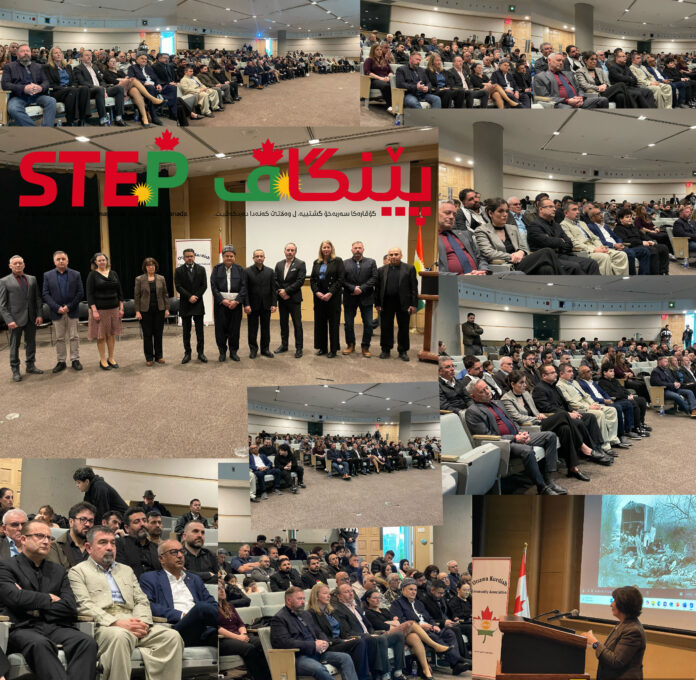Ottawa Kurdish Community Association
Commemorating Halabja: A Day of Remembrance and Resilience in Ottawa
Ottawa, ON – March 16, 2025 – From 1:00 PM to about 4:00 PM, the Kurdish community in Ottawa gathered at 101 Centrepointe Drive to commemorate the Halabja Massacre, one of the darkest chapters in Kurdish history. The event featured powerful speeches, emotional testimonies, poetry readings, a historical presentation, and a special musical tribute, bringing together survivors, political leaders, and advocates in a shared commitment to remembrance and justice.
A Survivor’s Story: Dr. Nermin Ibrahim’s Emotional Testimony
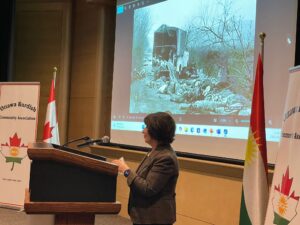
One of the most powerful and heartbreaking moments of the event came from Dr. Nermin Ibrahim, a Halabja survivor and President of the Ottawa Kurdish Cultural Forum. As a young doctor during the March 16, 1988, chemical attack, she witnessed unimaginable suffering while struggling to survive the horrors of war.
She recounted how, just before the bombing, she was invited to a house but did not go—and soon after, that very house was struck and destroyed. Fate had spared her from certain death. Later, she was invited to another house, where she was finally able to wash, eat, and gather herself after the overwhelming events of the day.
But there was no true refuge. As the chemical gas spread like a silent killer through the city, survival meant fleeing. Dr. Ibrahim and a group of others climbed into the back of a truck, escaping Halabja as the city lay in ruins behind them.
Their journey led them to the mountains, where she reunited with her cohort—fellow doctors, friends, and survivors. But what she saw there was horrifying:
- Many had been exposed to the chemical agents and were in excruciating pain.
- Their skin was burning, peeling, and blistering from the toxic gas.
- Some were struggling to breathe, their lungs ravaged by the poison.
Dr. Ibrahim did what she could to help, but in the mountains, with limited medical supplies, the suffering was immense.
As she recounted this agonizing memory, tears filled her eyes, and the audience sat in solemn silence, absorbing the weight of her words and the magnitude of her survival.
Historical Slideshow: A Chronicle of Kurdish Genocide
A slideshow presentation provided crucial historical context, ensuring that attendees understood that Halabja was not an isolated event, but part of a long history of genocide against the Kurdish people. The presentation chronicled:
- The earliest genocides against Kurds, tracing back to oppressive regimes that sought to erase Kurdish identity.
- The Anfal Campaign (1986–1989), where over 180,000 Kurds were systematically executed under Saddam Hussein’s rule.
- The Halabja Massacre (1988), where over 5,000 men, women, and children were killed by chemical weapons.
- The continued persecution of Kurds in Turkey, Iran, Iraq, and Syria, including the attacks on Rojava today, where Kurdish communities still face displacement, military aggression, and human rights violations.
This segment reinforced that the struggle for Kurdish recognition and justice is ongoing, and that the world must remain vigilant against continued atrocities.
Distinguished Speakers and Special Guests Stand in Solidarity
Several prominent figures addressed the audience, offering their reflections on Halabja and expressing their solidarity with the Kurdish people:
- Shwan Najim Akha, President of the Kurdish Community in Ottawa, spoke about the importance of unity and advocacy in keeping Kurdish history alive.
- Barbara Ball, the Conservative candidate for the federal riding of Nepean, expressed her support for Kurdish recognition and remembrance.
- Chandra Arya, Member of Parliament for Nepean, reaffirmed his commitment to raising awareness about the Kurdish struggle and human rights.
- Mr. Yves Duval, former Head of Canada’s Embassy Office in the Kurdistan Region, highlighted Canada’s diplomatic relationship with the Kurdish people and the importance of global recognition.
- The Jewish Federation of Ottawa was also present, standing in solidarity with the Kurdish community. Their participation underscored the shared pain of genocide survivors and the importance of inter-community support in ensuring historical atrocities are never forgotten.
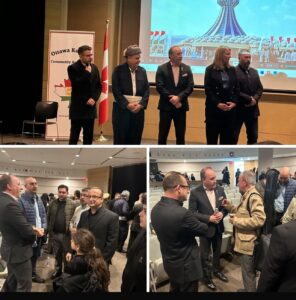
Poetry and Music: A Tribute to the Victims
Poetry readings throughout the event captured the grief, strength, and resilience of the Kurdish people, honoring those lost in Halabja. Each verse painted a picture of tragedy and survival, reminding the audience of the human cost of war.
A deeply moving moment came when Shahram Dostan performed a special song written exclusively on Halabja. His performance filled the room with sorrow and solidarity, leaving a lasting emotional impact on all who attended.
A Call for Awareness and Justice
While the event was a tribute to the past, it was also a call to action. Speakers emphasized:
- The urgent need for international recognition of Halabja as genocide.
- The importance of preserving Kurdish history and educating future generations.
- The responsibility to advocate for justice and ensure such atrocities never happen again.
Conclusion
The Halabja Commemoration in Ottawa was a deeply moving and educational event, uniting survivors, community leaders, and allies in a powerful display of remembrance and advocacy.
Through Dr. Nermin Ibrahim’s heartbreaking testimony, the historical slideshow, impactful speeches, poetry, and music, attendees left with a renewed commitment to honoring the victims and ensuring their stories are never forgotten.
As the event concluded at around 4:00 PM, one message remained clear: the Kurdish people will never forget, and the fight for justice must continue.
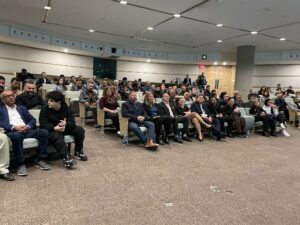
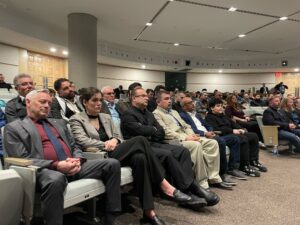
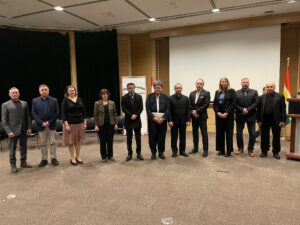
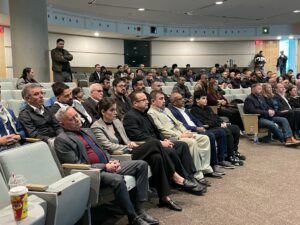
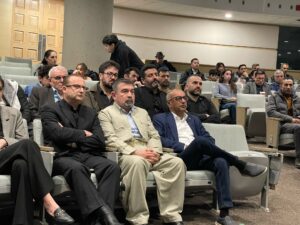
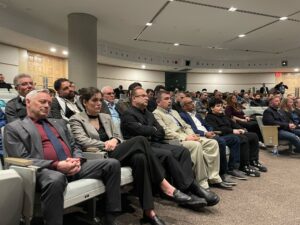
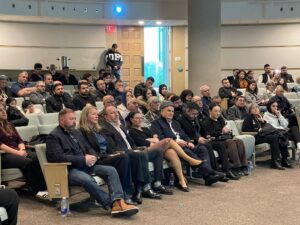
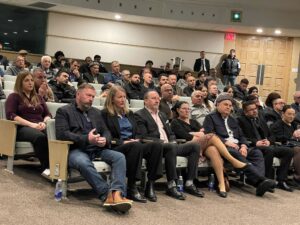
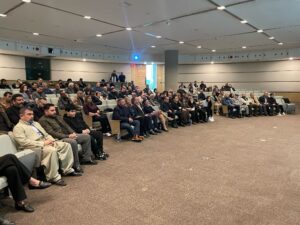
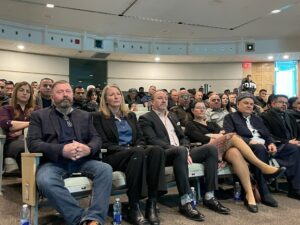
Halabja: The City That Wept
The sky turned pale, then choked in gray,
As death rained down that bitter day.
No warning came, no time to run,
No shield from what could not be undone.
Mothers fell with arms stretched wide,
Holding children who gasped and cried.
Fathers stood, but love was weak,
As poison burned through skin and cheek.
Lovers parted, breath by breath,
Their whispers drowned beneath the death.
No vows were spoken, no last embrace,
Just empty streets—no life, no trace.
The rivers wept, the mountains mourned,
A city crushed, its soul still torn.
The world moved on, but we still say,
Halabja’s pain won’t fade away.
—–Leyla Eskender—–
